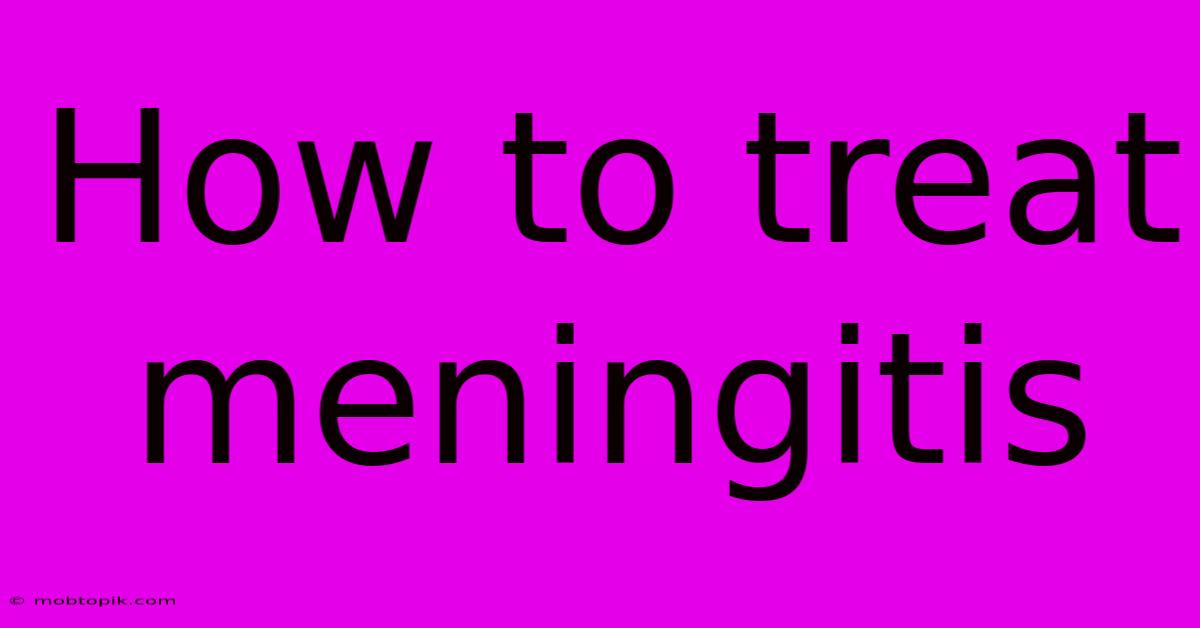How To Treat Meningitis

Discover more detailed and exciting information on our website. Click the link below to start your adventure: Visit Best Website mobtopik.com. Don't miss out!
Table of Contents
How to Treat Meningitis: A Comprehensive Guide
Meningitis, an inflammation of the protective membranes covering the brain and spinal cord, is a serious medical condition requiring immediate and appropriate treatment. This condition can be caused by various infectious agents, including bacteria, viruses, fungi, and even certain drugs. The treatment approach varies significantly depending on the underlying cause, the severity of the illness, and the patient's overall health. This article is for informational purposes only and should not be considered medical advice. Always consult a healthcare professional for diagnosis and treatment of any medical condition.
Understanding the Different Types of Meningitis
Before discussing treatment, it's crucial to understand that meningitis isn't a single disease. The treatment strategy hinges heavily on identifying the causative agent:
1. Bacterial Meningitis:
This is the most dangerous form, requiring immediate and aggressive treatment with antibiotics. Delay in treatment can lead to severe complications, including brain damage, hearing loss, learning disabilities, and even death. Common bacterial causes include Streptococcus pneumoniae, Neisseria meningitidis, and Haemophilus influenzae.
2. Viral Meningitis:
Viral meningitis is generally less severe than bacterial meningitis and often resolves on its own. Treatment focuses on managing symptoms, such as fever, headache, and stiff neck. Antiviral medications are rarely used unless a specific virus is identified and deemed treatable. Most cases are caused by enteroviruses.
3. Fungal Meningitis:
Fungal meningitis is less common but can be challenging to treat. It often requires long-term antifungal medication, and the choice of drug depends on the specific fungus identified. Cryptococcus and Histoplasma are common culprits.
4. Non-Infectious Meningitis:
In some cases, meningitis can be caused by non-infectious agents, such as certain drugs or autoimmune disorders. Treatment in these cases focuses on addressing the underlying cause. This might involve discontinuing the offending medication or using immunosuppressants.
Treatment Strategies for Meningitis
The treatment approach varies significantly based on the type of meningitis.
Treating Bacterial Meningitis:
This is a medical emergency. Treatment involves:
-
Intravenous Antibiotics: High doses of antibiotics are administered intravenously (IV) as soon as possible. The specific antibiotic chosen depends on the suspected causative bacteria and may be adjusted based on culture results. Broad-spectrum antibiotics are often used initially while waiting for lab results.
-
Supportive Care: This includes managing symptoms like fever, headache, and nausea. This may involve antipyretics (fever reducers), analgesics (pain relievers), and intravenous fluids to prevent dehydration.
-
Monitoring: Patients require close monitoring in a hospital setting. This involves regular neurological examinations, vital sign checks, and blood tests to assess the effectiveness of treatment and detect any complications.
-
Steroids: In certain cases, corticosteroids like dexamethasone may be administered to reduce inflammation and improve outcomes, especially in bacterial meningitis caused by Streptococcus pneumoniae.
Treating Viral Meningitis:
Treatment for viral meningitis primarily focuses on supportive care:
-
Rest: Adequate rest is crucial for recovery.
-
Hydration: Staying well-hydrated helps the body fight off the infection.
-
Pain Relief: Over-the-counter pain relievers, like acetaminophen, can help manage headache and muscle aches. Avoid aspirin in children due to the risk of Reye's syndrome.
-
Fever Reduction: Antipyretics can help lower fever.
-
Symptom Management: Treatment focuses on managing specific symptoms like nausea, vomiting, and photophobia (sensitivity to light).
Treating Fungal Meningitis:
Fungal meningitis requires long-term antifungal therapy, often lasting several weeks or months.
-
Antifungal Medications: The specific antifungal medication will depend on the type of fungus. Amphotericin B and fluconazole are commonly used.
-
Supportive Care: Similar supportive care as with bacterial meningitis is necessary.
Potential Complications of Meningitis
Untreated or inadequately treated meningitis can lead to severe complications, including:
-
Brain Damage: Infection can damage brain tissue, leading to neurological deficits.
-
Hearing Loss: Inflammation can affect the inner ear, resulting in hearing impairment.
-
Learning Disabilities: Brain damage can affect cognitive abilities.
-
Seizures: Meningitis can trigger seizures.
-
Death: Bacterial meningitis, if left untreated, can be fatal.
Prevention of Meningitis
Prevention strategies are crucial in combating meningitis:
-
Vaccination: Vaccinations are available for some types of bacterial meningitis, including Haemophilus influenzae type b (Hib), Streptococcus pneumoniae, and Neisseria meningitidis.
-
Hygiene: Practicing good hygiene, such as frequent handwashing, can help prevent the spread of infection.
-
Avoid Close Contact: Avoid close contact with individuals who are ill with meningitis.
-
Early Diagnosis and Treatment: Early recognition and treatment of meningitis are crucial for preventing severe complications.
When to Seek Medical Attention
Seek immediate medical attention if you or someone you know experiences symptoms suggestive of meningitis, such as:
- High fever
- Severe headache
- Stiff neck (meningismus)
- Sensitivity to light (photophobia)
- Confusion
- Nausea and vomiting
- Sleepiness or drowsiness
- Rash (especially in bacterial meningitis)
This information is not a substitute for professional medical advice. Always consult a healthcare provider for diagnosis and treatment of any medical condition. Early diagnosis and appropriate treatment are vital in managing meningitis and preventing potentially life-threatening complications. If you suspect you or someone you know may have meningitis, seek immediate medical attention.

Thank you for visiting our website wich cover about How To Treat Meningitis. We hope the information provided has been useful to you. Feel free to contact us if you have any questions or need further assistance. See you next time and dont miss to bookmark.
Also read the following articles
| Article Title | Date |
|---|---|
| How To Treat Mental Illness | Nov 29, 2024 |
| Odi | Nov 29, 2024 |
| How To Treat Addiction | Nov 29, 2024 |
| How To Treat Cold | Nov 29, 2024 |
| How To Treat Cancer | Nov 29, 2024 |
